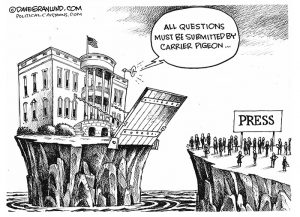Reprint courtesy of the Houston Chronicle
Transparency in government should be an inviolable marker of the people’s right to know.
It’s an old story: Elected officials take office and quickly forget that they are servants of the people, not mini-potentates. Likewise, bureaucrats running state agencies learn to ignore the fact that those agencies exist to do the people’s business. The people, those pesky citizens who pay their salaries, deserve to know how they’re doing.
How easy it is to forget that basic fact of public service. How convenient it is, as well, to have a high court that allows state government to evade transparency and the people’s right to know.
As Kelley Shannon of the nonprofit Freedom of Information Foundation of Texas pointed out recently, Texas has been fortunate to have one of the strongest public information laws in the nation. But now, the Texas Supreme Court, like a scissors-wielding Delilah, seems intent on shearing away the strength of our public-information Sampson. Two recent rulings have made it more difficult for the public to know how its government is functioning.
In one, the court decided that the nonprofit Greater Houston Partnership did not have to disclose its finances to the public because it was not a governmental body, even though it performed walk-like-a-duck, quack-like-a-duck economic development functions for the city of Houston.
In a second decision involving the aerospace company Boeing, the court ruled that a private party doing business with the government does not have to release information in government documents if releasing that information would provide an advantage to a competitor.
The result, as Shannon points out, is that “Information is getting closed off in seemingly straightforward cases of public interest, such as the city of McAllen keeping secret how much taxpayer money it paid for singer Enrique Iglesias to perform at a holiday concert.” The city didn’t want future entertainers to know how much Anna Kournikova’s main squeeze was able to squeeze out of the city for his appearance.
It’s not just a contract for the King of Latin Pop or how many ride-hailing permits the city of Houston granted Uber (another ruling affected by the court decision). Entire departments of state government are being contracted out and thus hidden from public access. Ross Ramsey of the Texas Tribune has mentioned child support, health and human services programs, state prisons and data services, among others. In those instances and a number of others, Attorney General Ken Paxton has instructed local governments not to release information to the public, because the state Supreme Court has ruled they don’t have to.
Fortunately, Paxton isn’t the last word and neither is the court. Lawmakers with a commitment to public access are preparing legislation for the coming session that would reverse the court’s decisions and restore the strength of the state’s public access guarantees. State Rep. Giovanni Capriglione, R-Southlake, is drafting legislation that would increase transparency in state contracting, while state Rep. Terry Canales, D-Edinburg, is putting together a bill that would address the Boeing ruling and specifically list entertainment contracts with government as public documents. Both deserve strong public support.









